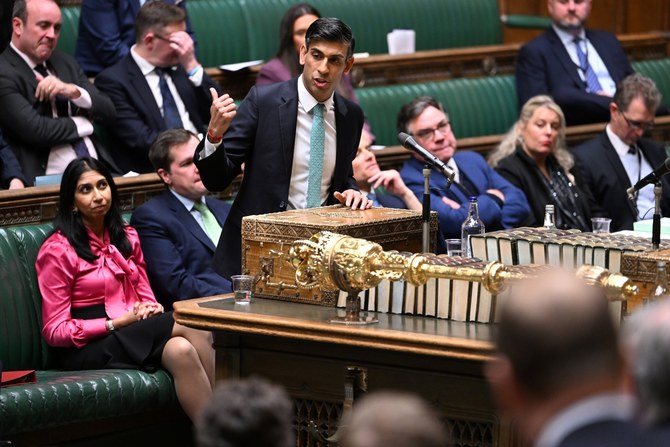Mohamed Chebaro
The news that the UK government of Prime Minister Rishi Sunak is planning to house migrants in tents to help deal with any surge in small boats crossings this summer is no doubt alarming and points to its continued absence of stable planning policies. Instead, the Conservative government seems to be resorting to half-baked, makeshift options that will ultimately fail to meet its own objective of containing the crisis, while showing that Britain is ready to break its own rules and laws regarding helping those most in need.
Media reports have indicated that the UK’s interior ministry has purchased tents that will be able to house up to 2,000 migrants on disused military sites at the end of August, in anticipation of a larger number of arrivals of migrants in small boats on the shores of southeast England. During the same period last year, the government was seen as being underprepared and overwhelmed by the number of arrivals. It was also criticized for rushing to pay for hotel rooms to house them, costing taxpayers huge sums. The tent plan has provoked disquiet within government ranks, as The Times newspaper reported that some officials had compared their use with concentration camps. This coincides with the anticipated opening of a newly moored barge, the Bibby Stockholm, which is capable of housing up to 500 migrants at a Dorset port. Home Office officials were expecting the first 50 migrants to be housed on it this week.
What is not news in this context, however, is that the UK’s immigration system is in tatters, as it has been for many years, and is in urgent need of fixing. Preparedness is surely important at all times, but what is clear is that the government might have been putting its money into the wrong places, such as handing a private firm a £1.6 billion ($2 billion) contract to manage the Bibby Stockholm, alongside other asylum accommodation and travel services. In March, London also signed a deal under which it will give France almost £500 million over three years to help stop migrants crossing the English Channel in small boats, hire 500 more French officers to patrol the shores and build a new detention center for refugees that will not be ready before 2026. And the Conservative government under Boris Johnson signed a deal in April 2022 with Rwanda, worth in excess of £140 million in a five-year trial, that could see asylum seekers sent to the East African country on a one-way ticket to claim asylum there. However, the UK is yet to send any migrants due to the policy being challenged in the courts. More than 45,000 people crossed the Channel in small boats last year to gain access to the UK, despite all the efforts of the French and British authorities to deter them. That number is expected to increase this year, with the peak expected between August and October, prior to the weather turning and making the crossing more treacherous.
Meanwhile, more than 160,000 asylum seekers remain in limbo in the UK, waiting for their applications to be processed. This is where the bottleneck exists and it has, over the years, encouraged more to make the journey, as applicants are generally accepted in the end, even if they have spent months if not years waiting to be vetted and processed, with the system moving at a slow, grinding pace. The Refugee Council claims that the UK’s asylum system is strictly controlled and complex, working against the odds with people who lack the necessary evidence on which to base their claim. But despite those challenges, 76 percent of the initial decisions in the year to June 2022 granted asylum or other forms of protection. Though the government has often promised more funding and more case workers, the variety of individual cases has made it nearly impossible to speed up the process. Linguistic and other cultural handicaps often related to countries torn by instability, wars and sometimes corruption make authenticating people’s stories and their routes difficult. The UK spends in excess of £3 billion a year on asylum, with almost £7 million a day spent on hotel rooms to accommodate refugees and asylum seekers. The new plans would certainly add to the bill and they also show that this government is ready to throw money at the problem in the hope that it will go away, without working to overhaul its rules or provide safe routes for people in need of protection.
The steps to symbolically deter would-be asylum seekers from paying people smugglers to help them reach British shores will not echo with people who have already been living in the open for months, like those stranded in Tunisia, or those awaiting the chance to cross the Mediterranean from Libya, some of whom will be Britain and France’s problem tomorrow.
The UK’s interior minister is hoping to tell the world that “Britain is not a soft touch” by broadcasting images of barges and tents awaiting refugees. However, what this government, or any other one, must do is work to reform the asylum system and stop using it to score political points. It needs to close any loopholes that exist to stop those who seek to take advantage of the system. The British government led by the Conservative Party risks further sinking the UK’s reputation by resorting to housing migrants in tents and floating barges and sending some illegal arrivals to Rwanda.
Arab News







